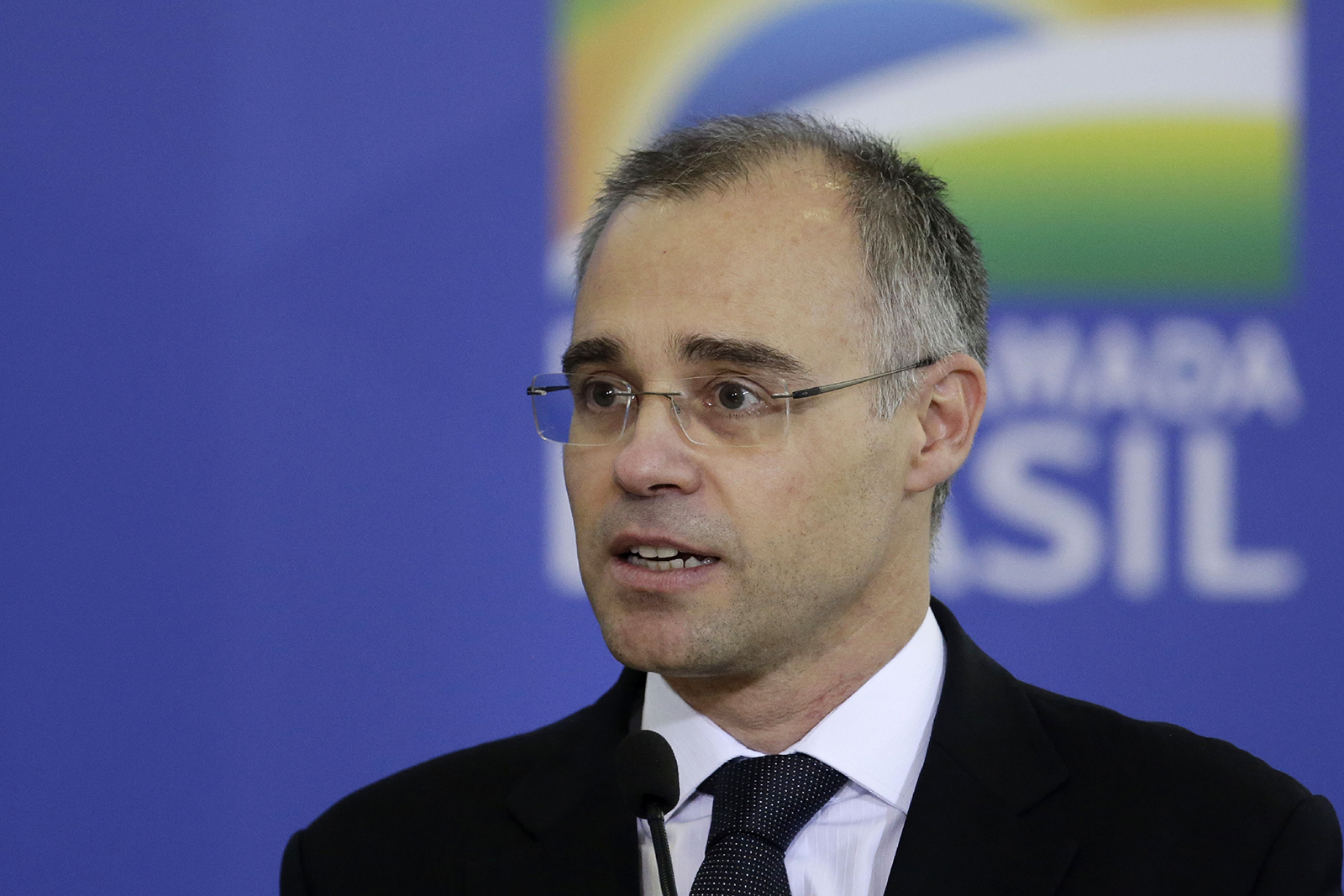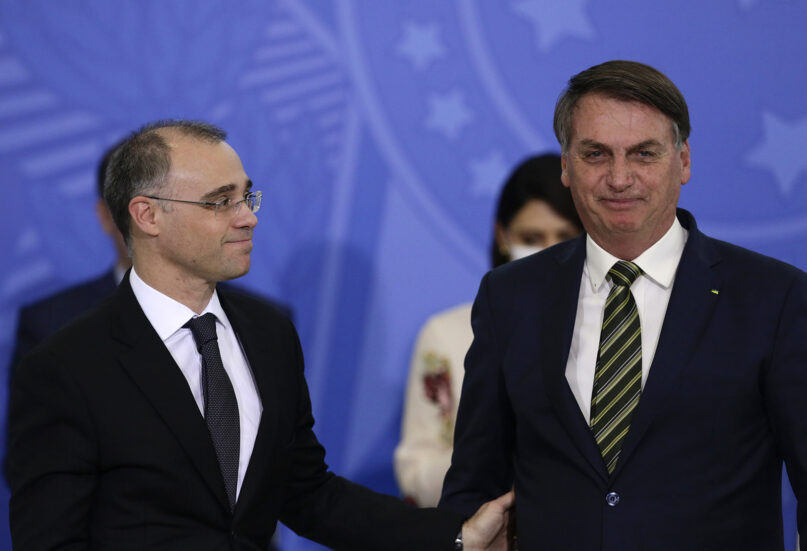SÃO PAULO (RNS) — Only a few months after taking office in January of 2019, Brazil’s President Jair Bolsonaro mentioned it was about time to have a Christian justice on the Supreme Court. Now, the far-right South American leader is fulfilling his longtime promise of a “terribly evangelical” justice through the nomination of current Attorney General André Mendonça, a Presbyterian minister.
Bolsonaro officially appointed Mendonça after Justice Marco Aurélio Mello’s retirement on July 12. Now the appointment awaits Senate confirmation. Mendonça is Bolsonaro’s second nomination for the court. In November 2020, he appointed Justice Kassio Nunes Marques, a judge whose Catholic faith was not very public.
Mendonça’s nomination has been seen by many as a political maneuver by Bolsonaro to strengthen his ties with a significant segment of his voters.
“Just as Supreme Court Justice Amy Coney Barrett, a conservative Catholic, was (former President Donald) Trump’s reward to his white evangelical and Catholic base, Mendonça is President Bolsonaro’s latest effort to shore up his evangelical base, which constitutes his main constituency,” said Andrew Chesnut, a religious studies professor at Virginia Commonwealth University and an expert in Brazilian religious dynamics.
Indeed, Mendonça seems to be a perfect fit for the role of a “terribly evangelical” justice, even though many in Brazil prefer to employ the term “evangelical” only for Pentecostals and neo-Pentecostals, using “Protestant” for Calvinists and Lutherans.
He grew up in an observant family from Santos, in São Paulo state, and earned a degree in theology after completing his law studies. According to the Rev. Juarez Marcondes, a prominent member of the Presbyterian Church of Brazil (the most important Presbyterian church in the country), Mendonça is an ordained minister and has served as assistant pastor at Presbyterian churches, especially in Brasília.
“He is a Christian man. First of all, he is an advocate of the Constitution. But he is a man of Christian principles,” Marcondes told Religion News Service.
Among the members of the powerful Christian bloc in Congress, a group that includes at least 105 congressmen and 15 senators, Mendonça’s nomination was received with enthusiasm.
“He is an evangelical pastor with an unblemished career and is a great expert in the Bible,” pastor Raul José Ferreira Jr., an adviser to one of the leading members of the Christian bloc, told RNS.
Ferreira said the Christian bloc had been waiting for Mendonça’s nomination “but feared to be surprised again,” as it was when Marques was appointed to the court in 2020. “We hoped to have at least two justices there to oppose the others, so we missed one shot. And we have never understood why,” Ferreira reflected.
He thinks most evangelicals in Brazil are happy about Bolsonaro’s latest choice. “The evangelicals are natural supporters of the current administration. Bolsonaro holds religious services in Brasília, talks to pastors at the palace and is married to an evangelical woman,” he said.
A retired Army captain who had been a congressman for three decades, Bolsonaro became famous in Brazil for his militarist ideas, his defense of the military junta that ruled between 1964 and 1985, and his zero-tolerance-on-crime rhetoric.
As he prepared to run for president in 2018, he began to court conservative Christians, particularly evangelicals and the Catholic charismatic renewal.
Bolsonaro is a Roman Catholic who was married twice before meeting his current wife, Michelle. He frequently accompanies her to evangelical services and was baptized in the Jordan River a few years ago by an evangelical minister. He does still often attend Catholic Mass and receives Communion.
Bolsonaro’s move was highly successful. Almost 70% of evangelicals voted for him in 2018. While his national approval rating has dropped to 24% — mainly due to his handling of the COVID-19 pandemic — many evangelical voters remain loyal to him. Among them, his approval rate is 37%.

Brazil’s new Justice Minister André Mendonça speaks during his swearing-in ceremony at the Planalto presidential palace, in Brasilia, Brazil, April 29, 2020. (AP Photo/Eraldo Peres)
Mendonça is politically aligned with Bolsonaro, Chesnut pointed out. “While Presbyterians in Brazil are generally not as politically conservative as Pentecostals, who make up at least 70% of Brazil’s Protestant population, Mendonça’s right-wing political orientation is squarely in line with that of the evangelical bloc,” he explained.
Critics remember when Mendonça served as Bolsonaro’s minister of justice and public security and opened inquiries into journalists, intellectuals and political opponents of the government, using his power as head of the Federal Police to do so.
The government ministry was also accused of assembling a dossier containing the personal information of hundreds of state employees, including university professors, identified as being “anti-fascist militants.”
“As Bolsonaro’s attorney general, he justified the administration’s unwillingness to ban religious services during the COVID-19 pandemic with biblical verses instead of constitutional law,” said Chesnut, who expects Mendonça to be the most conservative member of the Supreme Court if the Senate confirms his nomination.
Mendonça’s actions during the Bolsonaro administration have been decried by many in the legal sphere. That he is being appointed for his religiosity has also raised criticism.
“A Supreme Court justice is expected to have expert legal knowledge. His or her faith is irrelevant. The formulation used by the president to appoint him was very ill-conceived,” said Antônio Funari Filho, a prominent lawyer and human rights advocate who leads the Archdiocese of Sao Paulo’s Justice and Peace Commission.
Some critics fear that Mendonça may not be as independent of Bolsonaro as he should be in his new role. “And the person who is nominating him (Bolsonaro) does not seem to be too sympathetic to the constitution,” Funari Filho added, alluding to the president’s repeated threats of carrying out a coup d’état.
Funari Filho emphasized, however, that the Brazilian Constitution sets strict limits to most subjects and does not allow too much interpretation. “So, his supposed conservatism will be restrained by law itself,” he said.
Marcondes said he guarantees Mendonça is not a “militant” of any ideology and will respect the constitution above all. “He is only a citizen who professes his faith. He does not represent the Presbyterian Church, given that we never pressured the government for a position. And his decisions will not be dominant, given that he will have 10 colleagues,” Marcondes said.
Bolsonaro’s entwining of religious and state affairs, apparently incentivized by part of the country’s evangelical leadership, has long been abandoned by the once dominant Catholic Church, said Francisco Borba Ribeiro Neto, director of the Pontifical Catholic University’s Center of Faith and Culture in São Paulo.
“When it comes to social, political and legal matters, the Catholic Church believes its position corresponds to the aspirations of all people of goodwill, that is, the common good. That is why it does not make sense to advocate for a ‘terribly Catholic’ justice,” he said.
While the evangelical bloc in Congress has struggled to expand its dominance even in the judicial sphere, Catholics have a more plural set of political stances, Ribeiro Neto said. “Seven of the current Supreme Court justices are Catholic, but they do not vote uniformly in line with Catholic teachings,” he said.
In the opinion of Romi Bencke, a Lutheran pastor and the president of the National Council of Christian Churches, Mendonça’s faith is only a kind of varnish that covers the real political intent of his nomination.
“What really matters is that he is a supporter of Bolsonaro and is committed to his economic and anti-rights agenda,” she said, in a reference to Mendonça’s conservatism when it comes to issues such as abortion and medical cannabis, for instance.
“I’m very worried about the current face of Latin American Christianity. It’s conservative, does not want to debate the themes of the contemporary agenda and became dogmatic,” she said.
“The gospel apparently is not the central element anymore. It is an excuse for other interests,” she added.





